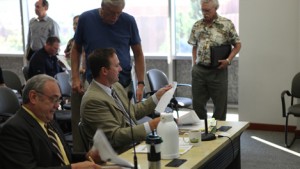If Clark County gives the green light, more than just baseball fans could end up paying for the construction of a $23 million, 6,000–seat stadium at Vancouver’s Clark College. An admissions tax could charge moviegoers, golfers, motocross fans, and concertgoers five percent per ticket in an effort to cover most of the cost of a new home field for the Class A Yakima Bears.
Whether the county’s board of commissioners will enact such a tax remains unclear following a finance work session on Wednesday that ended with a surprise twist and two separate funding proposals on the table, along with plenty of unanswered questions.
A proposal made earlier this summer by the Bears’ owner, Short Season, LLC, called for the county to cover 70 percent of construction costs for the stadium. Short Season would secure private financing, with Clark County contributing annually to debt service. The public, in turn, would own the stadium and athletic teams from Clark College and local youth leagues would have access to the facilities.
Proponents of the stadium, chief among them Commissioner Steve Stuart, D-Vancouver, argue that it will translate into hundreds of construction jobs and become a focal point for the community. The only question is how to pay for it.
“What we saw from all of these numbers that our staff has prepared is that it’s hard to achieve [a 70/30 split] even with all of the proposed fee revenue going to bond payment,” said Stuart.
Board Chair Tom Mielke, R-Battle Ground, expressed unwillingness to impose an additional tax or fee on Clark County residents without a vote. He asked county staff what would happen if certain groups in the county wanted to opt out of the tax, and as it turns out, the board has plenty of latitude.
“You’re not obligated to impose it on everybody that you could,” said Bronson Potter, chief civil deputy prosecuting attorney. “The board has wide discretion in determining what classes of activity to make subject to the tax.”
County staff explained that the county had no real viable funding options outside of an admission tax, since property taxes are almost tapped out, a luxury tax is already in place, and a local sales tax is not an option.
Clark County’s senior policy analyst Adriana Prata estimated that the admissions tax could generate as much as $960,000 in annual tax revenue, the majority of which would come from movie theater ticket sales in the 70/30 split proposal. Vancouver would generate $471,925 (49 percent), unincorporated Clark County $345,623 (36 percent), Camas $83,186 (9 percent), and Battle Ground $57,549 (6 percent).
The admissions tax would not be charged for public middle school or high school events or for entertainment that cost less than $4.
After county staff wrapped up the presentation, Stuart surprised the room by pulling out a single-paged graph outlying his own counter proposal, saying he didn’t think a 70/30 split was “fair and equitable given our tough economic times.”
Stuart called for a proposal in which Short Season would build the stadium up front. The county would still initiate an admissions tax, but for the first five years revenue would go to support the public venues where tickets were sold. He also would limit the admissions tax the new stadium, major movie theater complexes, the county fair, concerts at the fair, and the Sleep Country Amphitheater.
According to his plan, the county would pay 40 percent, Short Season 30 percent, and unnamed community partners would fill in the remaining 30 percent gap.
“I’m confident this community will make up the difference to get this done,” said Stuart.
Mielke was cool to the proposal, but commissioner Marc Boldt agreed to include the new proposal in future conversations. As this was a work session, the commission took no formal action on either proposal.
Reaction from audience members was mixed. Retired county commissioner Betty Sue Morris wasn’t impressed by what she heard.
“This is a shaky, risky business investment,” she said.
Mielke also expressed concern over parking issues the new stadium would create for neighbors who live near Clark College.
However, Kurt Boyd, the manager of business development for the Bellevue construction company PCL, believes a new stadium would be an economic boon for Vancouver. He was involved with constructing the Everett Events Center in Everett and says it has proven to be the economic catalyst it was meant to be. He is convinced the Clark County stadium project would be just as energizing.
“This is definitely a situation where if you build it, they will come,” he said.
Stuart is anxious to get a deal done, fearing that Short Season will move on before there is time to prepare a countywide vote. Simply put, he feels the project needs additional players.
“If there is a hole, someone has to fill it,” he said.










